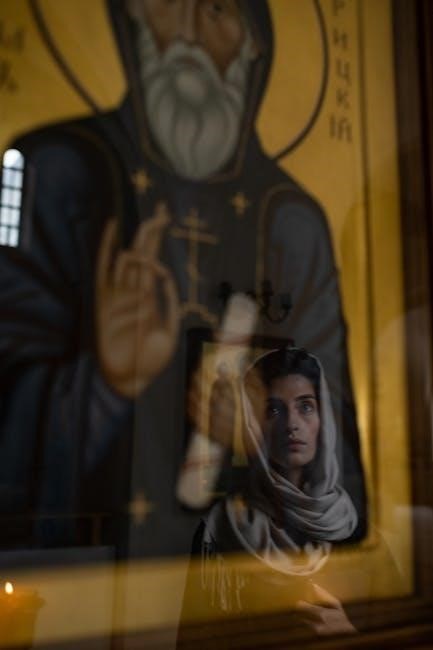Jennifer Saint’s Elektra is a captivating retelling of Greek mythology, weaving the stories of Clytemnestra, Cassandra, and Elektra. This lyrical novel explores their intertwining fates and the cursed House of Atreus, offering a fresh perspective on ancient tales.
1.1. Overview of the Novel
Elektra by Jennifer Saint is a captivating narrative that reimagines ancient Greek myths through the perspectives of three women: Clytemnestra, Cassandra, and Elektra. The novel delves into the cursed House of Atreus, exploring themes of vengeance, power, and fate. Saint’s lyrical prose weaves together the interconnected stories of these characters, offering a fresh and intimate look at their struggles within a patriarchal world. The book spans generations, tracing the cycle of violence and retribution that haunts the royal family. By focusing on the voices of these women, Saint sheds light on their agency and resilience amidst the turmoil of war and divine intervention, creating a compelling and emotional retelling of classic mythology.
1.2. Historical Context and Mythological Background
Jennifer Saint’s Elektra is deeply rooted in ancient Greek mythology, particularly the legends surrounding the House of Atreus. The novel draws from the infamous cycle of violence and revenge that defines this royal family, tracing its origins to the cursed actions of their ancestors. The story is set against the backdrop of the Trojan War, a pivotal event in Greek mythology, and explores the fates of women entangled in its aftermath. By reimagining these myths, Saint provides a fresh perspective on the historical and mythological events that shaped the lives of Clytemnestra, Cassandra, and Elektra. Her narrative highlights the enduring themes of divine intervention, family curses, and the societal expectations placed on women in ancient Greece.

The Three Female Perspectives

Jennifer Saint’s Elektra offers a compelling exploration of three women—Clytemnestra, Cassandra, and Elektra—each with distinct voices and experiences, providing a nuanced view of their interconnected stories.
2.1. Clytemnestra: The Queen of Mycenae
Clytemnestra, the wife of Agamemnon and queen of Mycenae, is a central figure in Elektra, embodying both strength and vulnerability. Her narrative reveals a complex character driven by grief, betrayal, and a deep sense of injustice. As the mother of Elektra and the wife of a king whose actions spark a cycle of violence, Clytemnestra’s perspective sheds light on the personal and political turmoil within the House of Atreus. Her story explores themes of maternal love, revenge, and the societal expectations placed on women in ancient Greece. Through her voice, Jennifer Saint humanizes a figure often vilified in myth, offering a poignant portrayal of a woman navigating a world shaped by male ambition and divine interference.
2.2. Cassandra: The Trojan Prophetess
Cassandra, the doomed prophetess of Troy, is another pivotal voice in Elektra, offering a haunting perspective on fate and prophecy. As a princess of Troy, she is burdened by visions of the future, yet cursed by Apollo so that no one believes her warnings. Her story intertwines with the House of Atreus, as her prophecies foretell the tragic events of the Trojan War and the inevitable downfall of her city. Cassandra’s narrative highlights her isolation and the weight of her gift, providing a poignant contrast to the other women’s tales. Jennifer Saint’s portrayal captures the complexity of a woman trapped between divine will and human ignorance, adding depth to the broader exploration of fate and resilience.
2.3. Elektra: Daughter of Agamemnon
Elektra, the daughter of Agamemnon and Clytemnestra, is a central figure in Jennifer Saint’s novel, embodying both fierce loyalty and deep-seated anguish. Her narrative explores her relentless quest for justice following her father’s murder, driven by a sense of duty and rage. Elektra’s character is marked by her unwavering dedication to her father’s memory, yet she is also torn by her complex feelings toward her mother and brother. Saint’s portrayal captures her resilience and the emotional turmoil of a woman caught in a cycle of vengeance and tragedy. Elektra’s voice adds a personal dimension to the broader tale of the cursed House of Atreus, highlighting the human cost of its dark legacy.

The Cursed House of Atreus
The House of Atreus is central to Elektra, burdened by a generational cycle of violence and vengeance. Jennifer Saint masterfully explores its dark legacy, shaping the characters’ fates and tragedies.
3.1. The Generational Cycle of Violence
The House of Atreus is plagued by a relentless cycle of violence, rooted in ancient curses and bloodshed. Jennifer Saint vividly portrays how each generation inherits this dark legacy, from Tantalus’ crimes to Agamemnon’s doomed choices. The sacrifice of Iphigenia, Clytemnestra’s subsequent revenge, and Orestes’ fateful vengeance exemplify the inescapable pattern of retribution. This cycle is not just physical but also emotional, as characters are consumed by rage, grief, and the weight of their ancestors’ actions. Saint’s narrative underscores the inevitability of fate, leaving the characters trapped in a spiral of violence that defines their existence. The cycle becomes a central theme, highlighting the destructive nature of unchecked vengeance and the futility of breaking free from the past.
3.2. The Role of the Gods in Shaping Fate
The gods in Elektra play a pivotal role in shaping the destinies of the characters, often through divine interference and prophecy. Zeus’ decrees, Apollo’s manipulations, and Artemis’ demands drive the plot forward, entwining mortal fates with divine will. Cassandra’s cursed gift of prophecy, granted by Apollo, exemplifies the gods’ influence, as her warnings are dismissed yet inevitably fulfilled. The sacrifice of Iphigenia, demanded by Artemis, sets off a chain of vengeance and tragedy. Jennifer Saint highlights how the gods’ capricious nature perpetuates the cycle of suffering, leaving mortals trapped in a web of fate. Their actions underscore the theme that even the mighty are subject to forces beyond their control, emphasizing the inevitability of their downfall.
Themes and Symbolism
Elektra explores themes of vengeance, female power, and the cursed House of Atreus. Symbolism surrounds the cycle of violence and divine retribution, shaping mortal destinies through prophecy and sacrifice.

4.1. Vengeance and Revenge in Greek Mythology
Vengeance and revenge are central themes in Elektra, driving the characters’ actions and shaping their destinies. Clytemnestra’s wrath over Agamemnon’s sacrifice of their daughter Iphigenia fuels her betrayal, while Elektra’s relentless pursuit of justice for her father’s murder consumes her. The novel highlights how revenge becomes a generational curse, perpetuating a cycle of violence within the House of Atreus. Cassandra’s prophetic warnings further underscore the inevitability of these acts of retribution. Through these narratives, Jennifer Saint explores the destructive power of vengeance, emphasizing its futility and the devastating consequences for all involved. The story underscores the timeless relevance of revenge as a motif in Greek mythology, resonating deeply with modern readers.
4.2. The Power of Women in a Patriarchal World
In Elektra, Jennifer Saint highlights the strength and agency of women in a male-dominated world. Clytemnestra, Cassandra, and Elektra each exemplify resilience and determination, challenging the patriarchal norms of their time. Despite being confined by societal expectations, these women wield significant influence through their intellect, courage, and unwavering convictions. Clytemnestra’s strategic mind and Elektra’s unrelenting determination illustrate their power, while Cassandra’s prophetic voice, though often dismissed, underscores the marginalization of women’s perspectives. The novel portrays their struggles and triumphs, emphasizing their ability to shape their own destinies despite systemic oppression. Saint’s portrayal of these women offers a compelling exploration of female strength in ancient Greece, resonating with contemporary themes of gender equality and empowerment.
4.3. The Curse of the Atreus Family
The curse of the Atreus family is a central theme in Elektra, rooted in a generations-long cycle of violence and vengeance. Originating from Tantalus’ crimes, the curse haunts Agamemnon’s lineage, perpetuating tragedy. The novel explores how this curse manifests through the family’s dark history, including Agamemnon’s sacrifice of Iphigenia and Clytemnestra’s subsequent betrayal. The curse is inescapable, driving characters to commit acts of retribution that further entrench their doom. Jennifer Saint’s portrayal highlights the inevitability of fate and the destructive power of unchecked vengeance, illustrating how the curse shapes the lives of Clytemnestra, Cassandra, and Elektra, binding them to a legacy of bloodshed and sorrow.
Author’s Style and Narrative Approach
Jennifer Saint’s lyrical prose masterfully weaves Greek mythology with emotional depth, employing multiple female narrators to create a rich, layered narrative that captivates and resonates deeply.
5.1. Jennifer Saint’s Retelling of Greek Myths
Jennifer Saint’s Elektra masterfully reimagines Greek mythology, blending tradition with a fresh, lyrical voice. By centering the narrative on three women—Clytemnestra, Cassandra, and Elektra—Saint humanizes mythological figures, exploring their complexities and emotions. Her approach emphasizes the agency and resilience of women in a patriarchal world, offering a nuanced perspective on the infamous House of Atreus. Saint’s prose is evocative and accessible, making ancient myths feel contemporary while staying true to their essence. This retelling not only honors the original stories but also invites readers to reflect on the timeless themes of fate, power, and vengeance. Her work resonates with both fans of mythology and newcomers alike, showcasing her skill in revitalizing classic tales for modern audiences.
5;2. The Use of Multiple Narrators
In Elektra, Jennifer Saint employs a compelling narrative technique by using multiple female voices—Clytemnestra, Cassandra, and Elektra—to recount the tragic events of the House of Atreus. Each narrator offers a distinct perspective, enriching the story with personal insights and emotions. Clytemnestra’s bitterness and determination, Cassandra’s prophetic despair, and Elektra’s fiery resolve weave together seamlessly. This approach allows readers to experience the same events through different lenses, creating a multifaceted exploration of the characters’ motivations and the curse that binds them. The interplay of these voices adds depth and complexity, highlighting the human cost of fate and vengeance. Saint’s use of multiple narrators ensures a dynamic and immersive reading experience, drawing readers into the heart of the myth.
Jennifer Saint’s Elektra is a powerful exploration of vengeance, fate, and the resilience of women in a patriarchal world. By weaving the perspectives of Clytemnestra, Cassandra, and Elektra, Saint sheds light on the generational curse of the House of Atreus. The novel masterfully highlights the human cost of violence and the enduring impact of divine meddling. Saint’s lyrical prose and nuanced characterizations bring ancient myths to life, offering a fresh yet faithful retelling. Ultimately, Elektra is a poignant reminder of the timelessness of Greek mythology and its ability to resonate with modern readers, leaving a lasting impression of tragedy, strength, and the unbreakable bonds of family.

